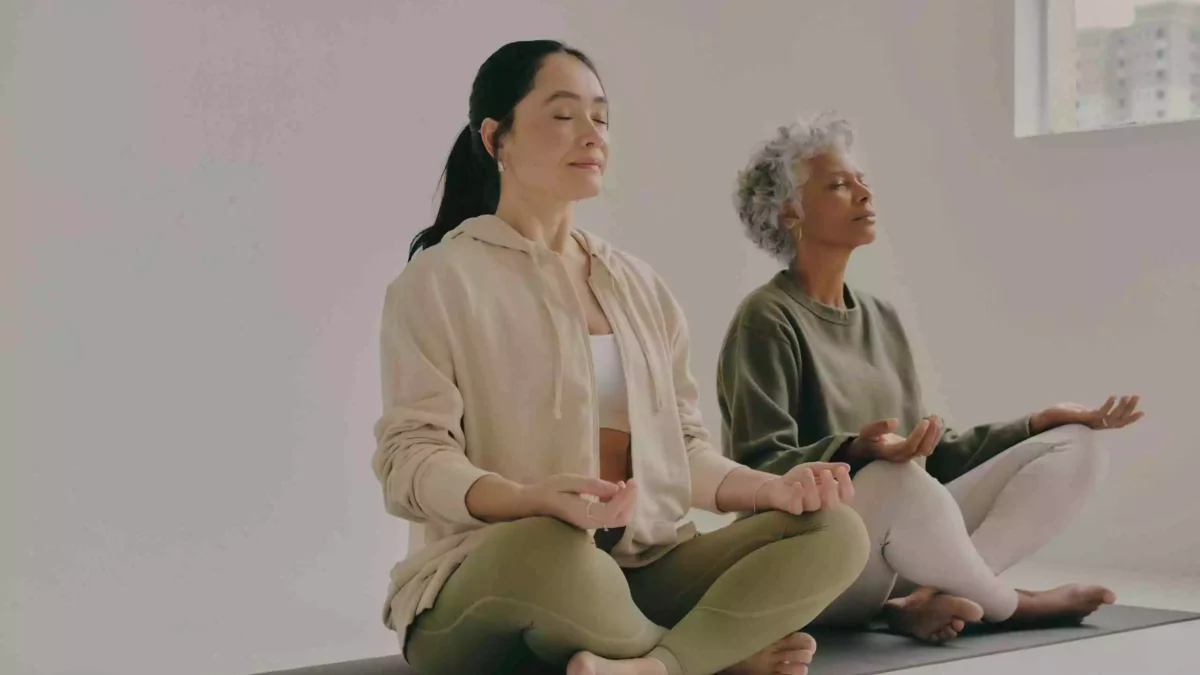
Adapting Your Beauty Routine for Sensitive Skin
August 4, 2025
The Importance of Bone Health: How to Prevent Osteoporosis
August 14, 2025Mindfulness meditation helps seniors reduce stress by promoting relaxation and mental clarity. Techniques like deep breathing and body scanning are effective.
Mindfulness meditation involves focusing on the present moment with a calm and non-judgmental awareness. This practice can significantly benefit seniors by reducing stress, enhancing emotional well-being, and improving cognitive function. Simple techniques such as deep breathing, body scanning, and guided imagery can be easily integrated into daily routines.
These methods help calm the mind and relax the body, making it easier for seniors to manage stress. Regular practice can lead to long-term health benefits, including lower blood pressure, improved sleep, and increased resilience to anxiety. Mindfulness meditation is an accessible and effective way for seniors to enhance their quality of life.
The Rise Of Mindfulness Meditation Among Seniors
Mindfulness meditation is becoming very popular among seniors. Many seniors find peace and calm through meditation. It helps them to stay focused and relaxed. This practice is simple and easy to learn. Seniors often feel less anxious and stressed. They also sleep better and feel more energetic. Meditation groups are forming in many communities. These groups offer support and friendship. Many seniors say meditation improves their quality of life.
Meditation can reduce stress and anxiety. It helps in improving sleep and boosting memory. Seniors often experience better emotional health. Meditation can also lower blood pressure. It promotes physical relaxation and mental clarity. Many seniors feel more connected and happy. This practice can help in managing chronic pain. Seniors find it easier to cope with daily challenges. Meditation supports overall well-being and happiness.
Fundamentals Of Mindfulness Meditation
Mindfulness means being aware of the present moment. It involves noticing your thoughts and feelings without judging them. Anyone can practice mindfulness, even seniors. It helps in reducing stress and feeling calm. Focus on your breath is a simple way to start. Seniors can do this while sitting comfortably.
Paying attention is the first principle. Notice what is happening around you. Acceptance is another key part. Accept your thoughts and feelings as they are. Non-judgment means not labeling your thoughts as good or bad. Patience is important. Give yourself time to get better at mindfulness. Trust in yourself and the process. Lastly, letting go helps in not holding onto thoughts or worries.
Stress Factors Unique To The Senior Population
Many seniors face health issues that can cause stress. These include chronic pain and mobility problems. Financial concerns can also be a major source of stress for elderly people. Loneliness and social isolation are common among seniors. Loss of loved ones can deeply affect their mental health. Cognitive decline can lead to frustration and anxiety.
Aging can make it harder to cope with stress. Physical limitations may increase feelings of stress. Memory loss can cause confusion and worry. Reduced social interactions may lead to loneliness. Health problems can increase stress levels. Seniors may also feel less control over their lives. Mindfulness meditation can help reduce these stress factors.
Tailoring Meditation To Senior Needs
Adapting techniques for seniors is important. Some seniors have limited mobility. Seated meditation can be helpful. Use chairs with good support. Breathing exercises are also effective. Encourage slow, deep breaths. Guided meditations with calming voices work well. Keep sessions short to avoid fatigue.
Simple movements during meditation can ease stiffness. Gentle neck rolls or hand stretches are good. Avoid difficult poses. Comfort is the priority. Use props like cushions for support. Seniors may also enjoy sound meditations. Soft music or nature sounds can be soothing.
A quiet and clutter-free space is ideal. Ensure good lighting. Natural light is best. Comfortable seating is crucial. Use chairs or cushions. Keep the temperature comfortable. Too hot or cold can be distracting. Add calming elements like plants or soft fabrics. A small table can hold items like water or tissues.
Safety is important. Remove tripping hazards. Make sure the floor is non-slippery. Easy access to the space is necessary. Avoid stairs if possible. Having a clock in the room can help keep track of time.
Starting A Meditation Practice In Senior Years
Begin by finding a quiet space. Sit in a comfortable chair. Close your eyes gently. Take a few deep breaths. Focus on your breathing. Feel the air entering and leaving your lungs. Try to do this for five minutes. Gradually increase the time as you get comfortable. Set small, achievable goals. Aim for consistency over perfection. Celebrate your progress, no matter how small.
It is normal to face obstacles. Thoughts may wander, and that’s okay. Gently bring your focus back to your breath. Physical discomfort can occur. Adjust your posture to find ease. Feeling impatient or frustrated is common. Practice kindness towards yourself. Remember, progress takes time. Don’t judge your meditation session. Every effort counts in the journey.
Guided Meditation Vs. Self-directed Practice
Guided meditation helps seniors follow a clear path. They listen to an instructor. This can be easier for beginners. The guide can offer specific instructions. This helps avoid confusion. But guided sessions may feel less personal. Some might not like the instructor’s voice or style.
Self-directed practice offers more freedom. Seniors can choose their pace and focus. This can feel more personal. But it can be challenging without guidance. Some might feel lost without instructions. It also requires more discipline.
Many seniors benefit from a mix of both methods. Starting with guided sessions can build confidence. Later, they can try self-directed practice. It’s important to find what works best. Some may prefer apps with both options. Others might like in-person classes. Listening to one’s own comfort is key.
Integrating Mindfulness Into Daily Routines
Simple exercises can help seniors stay calm. Start with deep breathing. Inhale slowly, then exhale. Repeat this five times. This helps to relax the mind. Next, try body scanning. Focus on each body part. Begin at the feet and move upward. Notice any tension and let it go. Gentle stretching is also useful. Stretch arms and legs softly. These exercises can fit easily into daily routines.
Mindful eating involves paying full attention to food. Chew slowly and savor each bite. Notice flavors, textures, and smells. This can make meals more enjoyable. Mindful walking is another great practice. Walk at a steady pace. Feel each step and breathe deeply. Look around and notice the surroundings. These activities can help reduce stress and improve well-being.
Tracking Progress And Maintaining Consistency
Start by keeping a journal. Write down your stress levels each day. Use a simple scale from 1 to 10. This helps you see your progress over time. Look for patterns in your mood and stress levels. Note any activities that reduce stress. Review your journal weekly. This will help you understand what works best.
Set small goals for yourself. Celebrate each achievement. Join a meditation group. This can keep you motivated. Share your experiences with others. Learn new techniques together. Keep your practice space neat. Make it a place you enjoy. Use reminders to stay on track. These can be notes or alarms on your phone. Try different meditation apps. They can offer new ideas and track your progress.
Technology Aiding Meditation For Seniors
Many apps offer guided meditation sessions. These sessions can help seniors reduce stress. Some popular apps include Headspace, Calm, and Insight Timer. These apps are easy to use and provide step-by-step instructions. Seniors can follow along at their own pace. Online resources offer videos and tutorials. These can be accessed anytime, making it convenient. Families can help seniors set up these apps. This ensures they can start meditating quickly.
Virtual meditation communities offer support and connection. Seniors can join these groups to meditate together. These communities use video conferencing tools like Zoom. Virtual classes are also available. These classes are led by experienced meditation teachers. Joining a community can make meditation more enjoyable. It can also help seniors feel less isolated. Virtual communities provide a sense of belonging.
Success Stories: Seniors Embracing Mindfulness
Mary from Canada began mindfulness at 70. She feels more peaceful daily. Raj from India practices breathing techniques. His stress has reduced significantly. Ana from Brazil started group sessions. She now enjoys better sleep and calm.
Long-term practice shows impressive results. Seniors report feeling more connected. They also notice improved health. Regular practice helps in better focus. Many seniors say they feel happier. Consistency is key to success.
Mindfulness meditation offers seniors a powerful tool for stress reduction. By incorporating these techniques, seniors can enhance mental well-being and overall health. Regular practice can lead to a more peaceful, fulfilling life. Encourage seniors to start their mindfulness journey today and experience the transformative benefits of meditation.

